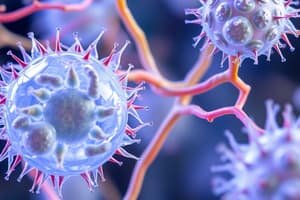Podcast
Questions and Answers
What is the most basic unit of life?
What is the most basic unit of life?
Cell
What do you call groups of cells working together for a similar function?
What do you call groups of cells working together for a similar function?
Tissue
What is a group of tissues working together for a similar function called?
What is a group of tissues working together for a similar function called?
Organ
What do you call groups of organs working together for a similar function?
What do you call groups of organs working together for a similar function?
What is any living thing referred to as?
What is any living thing referred to as?
What type of tissue covers and protects organs?
What type of tissue covers and protects organs?
A group of cells work together as tissue. Groups of tissues form organ systems.
A group of cells work together as tissue. Groups of tissues form organ systems.
An organ __________ is a group of organs that work together to do a job.
An organ __________ is a group of organs that work together to do a job.
What is a group of organs that work together to perform a specific task called?
What is a group of organs that work together to perform a specific task called?
What is an effect of the organization of tissues into groups?
What is an effect of the organization of tissues into groups?
List the four types of tissue that form the stomach, an organ.
List the four types of tissue that form the stomach, an organ.
What are three organ systems in the human body?
What are three organ systems in the human body?
Study Notes
Levels of Cellular Organization
- Cells are the fundamental units of life, serving as the building blocks for all living organisms.
- Tissues consist of groups of cells that collaborate to perform specific functions, emphasizing teamwork within biological systems.
- Organs are formed when various tissues work together, enabling them to fulfill specialized tasks critical for an organism's survival.
- Organ systems are composed of multiple organs that synergize to accomplish complex functions, illustrating the intricate connections within biological systems.
- Organisms represent any living entity, showcasing the diversity of life on Earth.
Types of Tissue
- Epithelial tissue plays a protective role, covering and safeguarding organs while also facilitating secretion and absorption.
Organ Structures and Functions
- A group of tissues organizes into organs, which, in turn, form organ systems, a clarification of their hierarchical relationship.
- Organ systems enable the execution of specific functions, enhancing the organism's capability to thrive.
- The organization of tissues into distinct groups allows for the performance of more complex physiological functions, reflecting the evolution of multicellular life.
Composition of the Stomach
- The stomach is an organ composed of four primary tissue types: epithelial, connective, nervous, and muscle, each contributing to its overall functionality.
Human Body Organ Systems
- Key organ systems in the human body include:
- Circulatory system responsible for transporting blood and nutrients.
- Respiratory system facilitating gas exchange.
- Digestive system processing food and nutrients.
- Nervous system controlling bodily responses and functions.
- Skeletal system providing structure and support.
- Muscular system enabling movement.
Studying That Suits You
Use AI to generate personalized quizzes and flashcards to suit your learning preferences.
Description
Test your knowledge on the various levels of cellular organization with this quiz. From the basic unit of life, the cell, to complex organisms, explore how cells, tissues, organs, and organ systems are interconnected. Perfect for biology enthusiasts and students alike!




